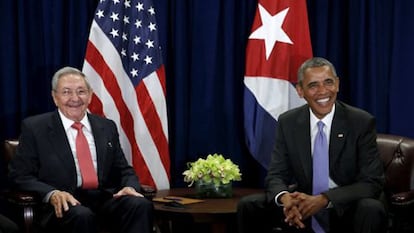Obama and Castro hold second historic face-to-face in New York
US and Cuban leaders adopt broad smiles to reinforce rapprochement

US President Barack Obama and Cuban President Raúl Castro buttoned their jackets, put on their biggest smiles and firmly shook hands before heading into their second private face-to-face meeting since Washington and Havana agreed to work on thawing relations at the end of last year.
Meeting at the United Nations in New York where they both addressed the General Assembly, the two leaders even joked in front of reporters before sitting down behind closed doors to hold serious talks on the issues that are keeping relations from moving forward.
The pace of the process toward normalization of relations will depend on the lifting of the blockade” Cuban Foreign Minister Bruno Rodríguez
During his speech at the UN, Castro made it clear that he would not let up on his demands on the United States. Besides calling on the US to lift the 55-year-old economic embargo, the 84-year-old president also demanded the return to the Cuban government of the Guantánamo naval base on the southeastern tip of the island; the end to “subversive” radio and television broadcasts by both Washington and Cuban exile groups; and compensation for the “human suffering” caused by the embargo.
For its part, the United States has said that Cuba must respect human rights and allow more press freedom – issues that have bothered the Castro government.
“The pace of the process toward normalization of relations between Cuba and the United States will depend on the lifting of the blockade,” said Cuban Foreign Minister Bruno Rodríguez in a meeting with reporters.
In his speech before the UN, Obama said he was confident that Congress would lift the embargo.
But Rodríguez said that if US lawmakers ignored Obama’s request, the US president had “very broad executive powers” to “substantially” change how the embargo is applied.
When asked about the regulatory changes that Obama has introduced to allow more Americans to travel and do business with Cuba, Rodríguez said those measures had “very limited value” and would not have any profound effects on the embargo.
Yet the Cuban minister did not say what his country’s proposals to the United States were to help normalize relations.
Washington is also calling for compensation for the US holdings and private businesses that were expropriated after the end of the Cuban Revolution in 1959.
In a press statement about the meeting, the White House on Tuesday said that Obama “underscored that continued reforms in Cuba would increase the impact of US regulatory changes.” At the same time, the US president “reiterated our support for human rights in Cuba,” the White House said.
Washington wants compensation for the US holdings expropriated after the Cuban Revolution
On this point, which has angered Havana, Rodriguez said that political rights and civil liberties were “guaranteed” in his country and repeated Castro’s charges that these issues were part of a “political manipulation.”
Castro also took advantage of his stay in New York to meet US Democratic and Republican lawmakers who support lifting the embargo, as well as businessmen and members of the Cuban-American community.
This week, US Commerce Secretary Penny Pritzker is scheduled to travel to Havana for the first time to discuss the new regulatory changes proposed by Obama.
English version by Martin Delfín.
Tu suscripción se está usando en otro dispositivo
¿Quieres añadir otro usuario a tu suscripción?
Si continúas leyendo en este dispositivo, no se podrá leer en el otro.
FlechaTu suscripción se está usando en otro dispositivo y solo puedes acceder a EL PAÍS desde un dispositivo a la vez.
Si quieres compartir tu cuenta, cambia tu suscripción a la modalidad Premium, así podrás añadir otro usuario. Cada uno accederá con su propia cuenta de email, lo que os permitirá personalizar vuestra experiencia en EL PAÍS.
¿Tienes una suscripción de empresa? Accede aquí para contratar más cuentas.
En el caso de no saber quién está usando tu cuenta, te recomendamos cambiar tu contraseña aquí.
Si decides continuar compartiendo tu cuenta, este mensaje se mostrará en tu dispositivo y en el de la otra persona que está usando tu cuenta de forma indefinida, afectando a tu experiencia de lectura. Puedes consultar aquí los términos y condiciones de la suscripción digital.









































